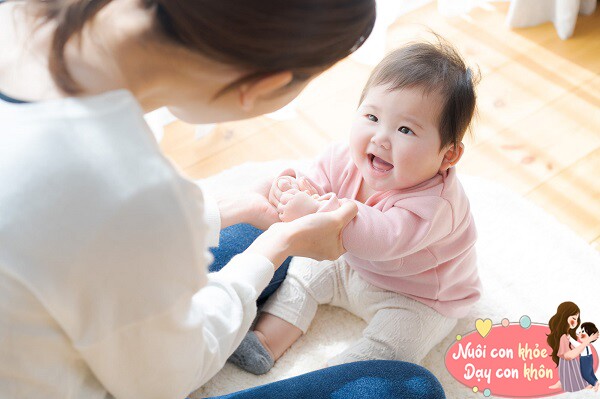According to experts, to raise a happy and confident child, parents need to take certain steps, starting from infancy. 
Eat, Drink, and Play: Simple Satisfaction is the Foundation for Emotional Stability
Children need adequate sleep, proper nutrition, and attentive care. Most crying bouts are due to unmet needs. Only when children get enough sleep, eat enough, and feel comfortable do they tend to be cheerful and content.
Regarding play, interesting toys and games can essentially meet their needs. Play is the best way to keep children cheerful.

Eating, drinking, and playing provide simple satisfaction, laying the foundation for emotional stability.
Mothers should engage in age-appropriate play with their children daily to enrich their lives.
Additionally, children need to learn proper social skills. For instance, mothers can take their children out to interact with kind and friendly strangers. Connect them with peers of a similar age.

Hugs and Touch: Children will be Emotionally Stable and More Confident
According to a survey by American psychologist Rene Spitz, if childcare institutions rely solely on mechanized feeding and avoid human contact, children’s physical and mental development will be severely impacted.
His research demonstrated that children require human interaction and care to develop holistically. A lack of affectionate care can lead to loneliness and difficulties in forming social relationships in the future.

Hugs and physical touch help children develop emotional stability and confidence.
Skin-to-skin contact can fulfill emotional needs and is key to a child’s emotional development and the formation of interpersonal relationships.
Warm hugs, gentle handholds, and kisses from parents are not just displays of affection but also ways for children to perceive themselves and the world around them. These actions make children feel loved, secure, and protected.
The warmer and closer the embrace, the more emotionally secure and confident a child will become.

Maternal Bond: Mommy, I Love You, Too
Newborns have the closest contact with their mothers. A mother’s warm embrace, sweet milk, charming smile, and gentle caresses make the child feel comfortable and content. When a mother playfully teases, the child will soon respond with a smile.
This cheerful emotion gradually forms a strong bond between the child and the mother, making the child feel safe and happy. This healthy relationship is the starting point for the child’s development of happy emotions.
Additionally, a mother’s emotions can truly influence her child. An anxious mother may raise anxious children.
Therefore, mothers should try to prevent their negative emotions from impacting their children.

Harmonious Family Relationships: Building Trust and Conveying Positive Emotions
Even at a very young age, children can sense the atmosphere between their parents. Their emotional development progresses gradually from the inside out.
Parents and family members are a child’s first points of contact, serving as role models for behavior.
A happy and harmonious family life can help children build trust, and the expression of positive emotions can lay the foundation for future relationships.

A harmonious family relationship helps build trust and convey positive emotions.
In life, work pressures, family conflicts, and the challenges of raising young children are inevitable.
However, don’t transmit stress directly to your children. Avoid arguing or taking out your frustrations on them. Even in disagreements, family members should respect, understand, and resolve conflicts peacefully. Apart from making children feel better, this also teaches them how to cope with stress.

Responding to Crying: Valuing a Child’s Tears Means Attending to Their Emotions
Apart from expressing basic needs like hunger, children sometimes cry without an apparent reason. In such situations, some parents may display indifference or ignore their child’s tears. This can have negative consequences.
Parents need to recognize that indifference can make children feel insecure, leading to emotions like irritability, anxiety, and fear. These emotions impact their current mood and hinder the development of stable emotions and a healthy personality in the future.

Valuing a child’s tears means paying attention to their emotions.
When a child cries for “no reason,” they may simply need some psychological comfort. Parents don’t have to fulfill their child’s every whim, but a timely response with empathy will help them feel safe and loved.
Gentle hugs or words of comfort are precious “medicines” for a child’s spirit, helping them realize that their emotions are valued and respected.

































